Interpublic Group Bundle
What's Next for Interpublic Group (IPG) in the Advertising World?
The advertising and marketing landscape is on the brink of a major transformation, with Omnicom Group's proposed acquisition of Interpublic Group (IPG) signaling a pivotal shift. This $13 billion deal, announced in late 2024, promises to reshape the industry, creating a global advertising powerhouse. Understanding the Interpublic Group SWOT Analysis is crucial to grasping the implications of this merger and IPG's future trajectory.
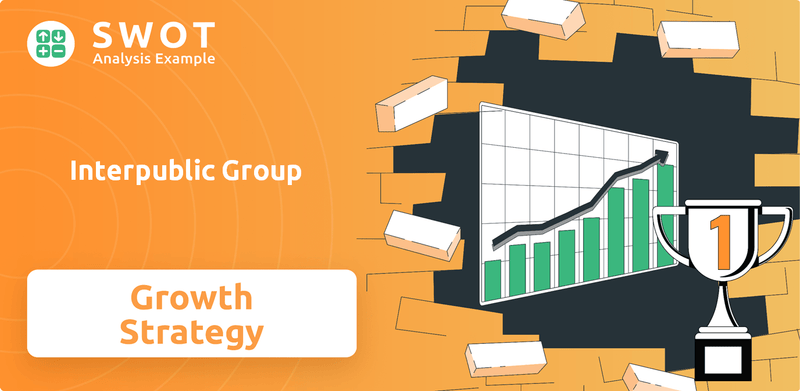
This strategic move is designed to enhance IPG's growth strategy and market position, particularly in the digital marketing and data analytics sectors. As IPG Company navigates this transformative merger, stakeholders are keenly focused on how the combined entity will leverage its expanded scale and capabilities for business development. This analysis will explore the future prospects of IPG, examining its expansion initiatives, innovation strategies, and the long-term growth strategy designed to capitalize on emerging market opportunities and technological advancements within the advertising agency landscape.
How Is Interpublic Group Expanding Its Reach?
The expansion initiatives of Interpublic Group (IPG) are heavily influenced by its pending merger with Omnicom, anticipated to conclude in the second half of 2025. This strategic move is designed to boost data-driven services, leveraging capabilities like Acxiom, and to strengthen client retention by expanding global reach. The merger also aims to reduce redundancies in overlapping markets, streamlining operations.
Beyond the merger, IPG is actively pursuing strategic acquisitions to enhance its capabilities and maintain its Growth Strategy. A notable example is the December 2024 acquisition of Intelligence Node, an AI-powered retail analytics firm, for approximately $100 million. This acquisition is a strategic move to capitalize on the rapidly growing retail media sector and to strengthen IPG's data analytics capabilities, aligning with the company's focus on expanding offerings in principal media trading and boosting central resources.
IPG continues to invest in expanding its capabilities in the digital advertising market, a crucial area given the shift of ad dollars towards more targeted digital campaigns. The company's strategic transformation program, initiated in Q1 2025, involved $203.3 million in restructuring charges. This program aims to enhance service offerings in production and analytics through greater consolidation into centers of excellence. These efforts include improving operating efficiencies across its agencies, strategic centralization of corporate functions, and increased offshoring and nearshoring.
The merger with Omnicom is a key driver for Interpublic Group's expansion, expected to be completed in the second half of 2025. This will amplify scale in data-driven services and strengthen client retention. The combined entity aims to reduce redundancies in overlapping markets, streamlining operations and increasing efficiency.
IPG has been actively acquiring companies to enhance its capabilities. The acquisition of Intelligence Node, an AI-powered retail analytics firm, for approximately $100 million in December 2024, is a prime example. This move strengthens IPG's data analytics capabilities and capitalizes on the growth in retail media.
IPG is investing heavily in the digital advertising market, responding to the shift of ad dollars toward targeted digital campaigns. The strategic transformation program, which started in Q1 2025, includes initiatives to improve operating efficiencies and enhance service offerings.
The strategic transformation program, which began in Q1 2025, involved $203.3 million in restructuring charges. This program aims to enhance service offerings in production and analytics. These efforts include improving operating efficiencies across its agencies, strategic centralization of corporate functions, and increased offshoring and nearshoring.
IPG's expansion strategy is multifaceted, focusing on mergers, acquisitions, and internal transformation. These initiatives are designed to enhance data analytics, strengthen client relationships, and improve operational efficiency.
- Merger with Omnicom to increase scale and reduce redundancies.
- Acquisitions like Intelligence Node to enhance data analytics capabilities.
- Strategic transformation program to improve operational efficiencies.
- Focus on digital advertising to capture market share.
Interpublic Group SWOT Analysis
- Complete SWOT Breakdown
- Fully Customizable
- Editable in Excel & Word
- Professional Formatting
- Investor-Ready Format
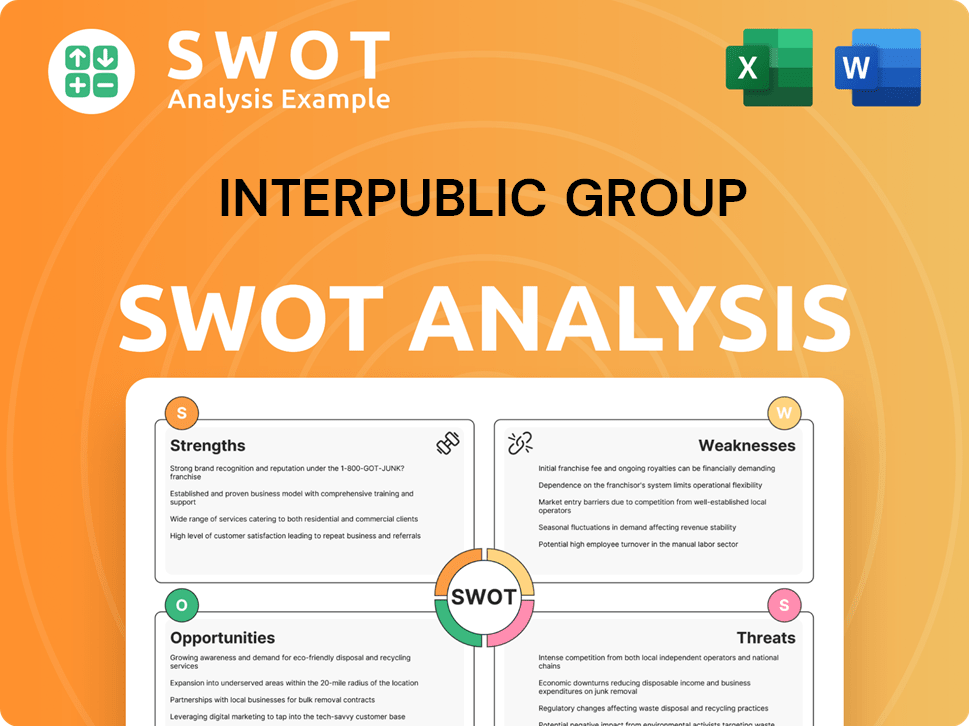
How Does Interpublic Group Invest in Innovation?
The Marketing Strategy of Interpublic Group is heavily influenced by its innovation and technology strategy, which is a key driver for its growth. The company focuses on digital transformation and the integration of cutting-edge technologies to maintain a competitive edge in the advertising agency landscape. This approach is crucial for adapting to evolving market demands and client needs.
IPG's strategy includes centralizing certain corporate functions and client service delivery to streamline operations. This approach aims to improve efficiency and speed up the implementation of new technologies and platforms. The goal is to create a more agile and responsive organization capable of meeting the challenges of the rapidly changing marketing communications industry.
IPG is investing significantly in advanced capabilities, particularly in AI and data analytics, to enhance its service offerings and drive growth. The company's strategic initiatives and investments aim to improve its service offerings and contribute to its growth objectives in a rapidly evolving market.
IPG centralizes corporate functions and client service delivery. This streamlining speeds up simplification and platforming efforts. This approach enhances operational efficiency and responsiveness.
The company is actively investing in AI and data analytics. The acquisition of Intelligence Node in December 2024, an AI-powered retail analytics firm, is a key example. These investments enhance data capabilities and expand into the retail media sector.
IPG's Omni platform connects services across practice areas. It uses high-fidelity datasets and custom AI tools for campaign planning, creation, targeting, optimization, and attribution. This integrated workflow enhances efficiency.
GenAI is a key area for operational initiatives and growth strategies. IPG is leveraging GenAI to improve productivity and drive innovation. This focus aims to enhance service offerings.
IPG's restructuring program includes AI tools like the AI Console to boost productivity. The Q1 2025 charges of $203.3 million reflect this strategic investment. This initiative aims to streamline operations.
Yaniv Sarig was appointed as Global Head of AI Commerce in April 2025. Momentum Worldwide named Jason Alan Snyder as its Chief AI Officer in April 2025. These appointments highlight IPG's commitment to AI integration.
IPG's focus on innovation and technology is evident through its strategic investments and appointments. These initiatives are designed to enhance the company's capabilities and drive growth in the advertising agency sector.
- Data Analytics: Investments in AI and data analytics are central to IPG's strategy.
- AI Integration: The company is integrating AI across various functions.
- Platform Development: The Omni platform is designed to streamline workflows.
- Strategic Appointments: Key hires like Yaniv Sarig and Jason Alan Snyder emphasize the commitment to AI.
Interpublic Group PESTLE Analysis
- Covers All 6 PESTLE Categories
- No Research Needed – Save Hours of Work
- Built by Experts, Trusted by Consultants
- Instant Download, Ready to Use
- 100% Editable, Fully Customizable
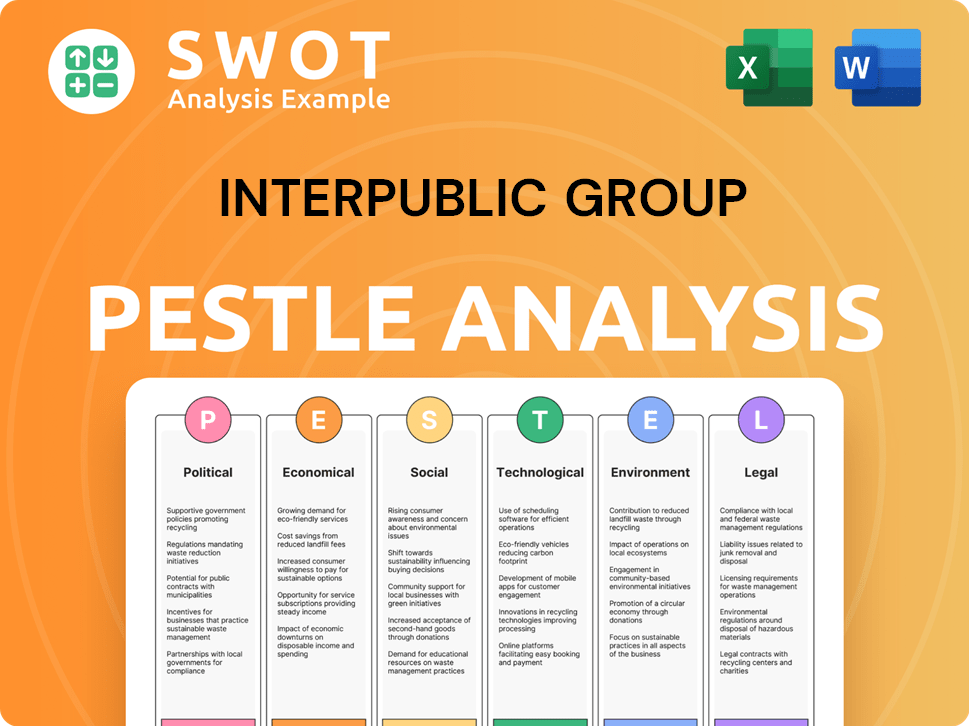
What Is Interpublic Group’s Growth Forecast?
The financial outlook for the Interpublic Group (IPG) in 2025 reflects a strategic shift amidst challenges. The company anticipates an organic revenue decrease of 1% to 2% for the full year 2025. This is primarily due to client losses in 2024, influenced by changes in the media trading environment and account activity. Despite these headwinds, IPG projects an adjusted EBITA margin of 16.6% for 2025.
In the first quarter of 2025, IPG reported total revenue of $2.3 billion, a decrease from $2.5 billion in Q1 2024. Net revenue also declined by 8.5% year-over-year, reaching $2.0 billion. The organic net revenue decrease for Q1 2025 was 3.6%. The company recorded a net loss of $85.4 million for the quarter, which included significant restructuring charges. However, the adjusted EPS for Q1 2025 was $0.33, exceeding expectations.
For the full year 2024, IPG's total revenue was $10.7 billion, with a net income of $689.5 million, showing a modest organic revenue growth of 0.2%. The adjusted EBITA for 2024 was $1.5 billion, with a 16.6% margin. The company is executing a restructuring program throughout 2025, expecting approximately $250 million in cost savings in 2025, and full run-rate savings of $300-$350 million from 2026. This program aims to enhance offerings and achieve substantial structural cost reductions.
IPG's financial results highlight the impact of market dynamics and strategic initiatives. The company's Q1 2025 results show a revenue decline, but the adjusted EPS indicates effective cost management. The full-year 2024 results provide a baseline for understanding the current challenges and strategic direction of the IPG Company.
The restructuring program is a key element of Interpublic Group's strategy to improve profitability. The anticipated cost savings of $250 million in 2025 and $300-$350 million from 2026 demonstrate the company's commitment to operational efficiency. This is crucial for long-term growth strategy.
Omnicom's projections, considering a potential merger, suggest a net revenue decline in 2025 followed by growth through 2029. Analysts forecast earnings and revenue growth, with EPS expected to increase significantly. This outlook is crucial for understanding the future prospects of the Advertising Agency.
IPG's strategic transformation involves cost reduction and enhancing offerings. This includes streamlining operations and optimizing investments in areas like data analytics. These efforts are critical for Business Development and maintaining a competitive edge in the market.
The advertising industry is dynamic, and IPG faces challenges from shifts in the media trading environment. The company's ability to adapt and innovate will be key to its long-term success. Understanding the competitive landscape is essential for effective Marketing Communications.
Investors should consider these financial projections and strategic initiatives when evaluating IPG. The restructuring program and future growth forecasts provide insights into the company's potential. For more details, you can learn about Owners & Shareholders of Interpublic Group.
Interpublic Group Business Model Canvas
- Complete 9-Block Business Model Canvas
- Effortlessly Communicate Your Business Strategy
- Investor-Ready BMC Format
- 100% Editable and Customizable
- Clear and Structured Layout
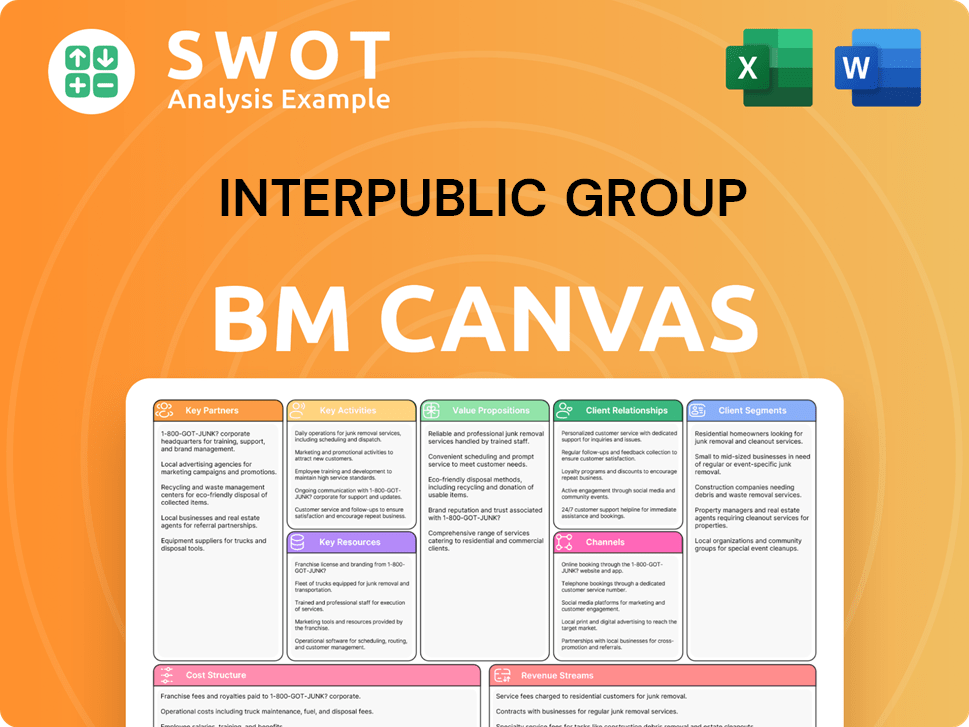
What Risks Could Slow Interpublic Group’s Growth?
The Interpublic Group (IPG) faces significant challenges that could hinder its growth strategy and overall performance. These risks stem from intense competition, client attrition, and the complexities of mergers and acquisitions. Understanding these obstacles is crucial for assessing the future prospects of the IPG Company.
One of the primary risks is the highly competitive advertising landscape. IPG contends with established advertising agencies and disruptive startups offering innovative services. This necessitates continuous investment in talent and technology to remain competitive, potentially straining resources and affecting profit margins. The company's financial health is also vulnerable to broader economic trends that influence client spending on advertising and marketing services.
Furthermore, IPG's performance is directly impacted by client losses. The company experienced a net organic revenue decline of 1.8% in Q4 2024, and an anticipated organic decrease of 1% to 2% for the full year 2025. The loss of key accounts in 2024, such as Amazon's media business and creative accounts from Pfizer and GM, is expected to affect 2025 results. These losses highlight the volatility of the advertising industry and the importance of client retention.
The advertising industry is fiercely competitive. IPG faces challenges from traditional rivals and innovative startups, requiring continuous investment in talent and technology to stay ahead. This competition can strain resources and margins, impacting the IPG Company's profitability and growth strategy.
Client losses significantly affect IPG's financial performance. The company experienced a net organic revenue decline in Q4 2024, and more losses are projected to impact 2025. High-profile client departures demonstrate the need for strong client relationships and effective retention strategies for the Advertising Agency.
Economic downturns can lead to reduced client spending on advertising and marketing services, directly affecting IPG's revenue and profitability. Economic volatility poses a significant risk, as it can lead to budget cuts and decreased demand for Marketing Communications.
The proposed merger with Omnicom, while potentially offering significant synergies, presents integration complexities and regulatory hurdles. The U.S. Federal Trade Commission issued a second request for information regarding the merger in March 2025. The integration process is expected to take nearly a decade.
IPG's digital marketing services are subject to stringent data protection and privacy regulations, such as GDPR and CCPA. Compliance with these regulations poses regulatory and privacy concerns, adding complexity to IPG’s operations. These regulations can affect IPG’s Business Development.
While IPG is investing in AI integration and automation, implementation challenges may arise. The early stages of AI integration and automation face implementation challenges. IPG’s restructuring efforts, with $203.3 million incurred in Q1 2025, also indicate the significant changes underway.
IPG's growth strategy faces substantial hurdles, including intense competition and client attrition, which directly impact financial performance. The competitive landscape requires continuous adaptation and investment. The loss of significant clients underscores the need for strong client relationships and strategic business decisions. For more insights, consider exploring the Target Market of Interpublic Group.
Operational risks include economic downturns, merger complexities, and regulatory challenges. Economic fluctuations can reduce client spending, while mergers introduce integration difficulties and regulatory scrutiny. The company must navigate data privacy regulations, such as GDPR and CCPA, adding to operational complexities.
Interpublic Group Porter's Five Forces Analysis
- Covers All 5 Competitive Forces in Detail
- Structured for Consultants, Students, and Founders
- 100% Editable in Microsoft Word & Excel
- Instant Digital Download – Use Immediately
- Compatible with Mac & PC – Fully Unlocked
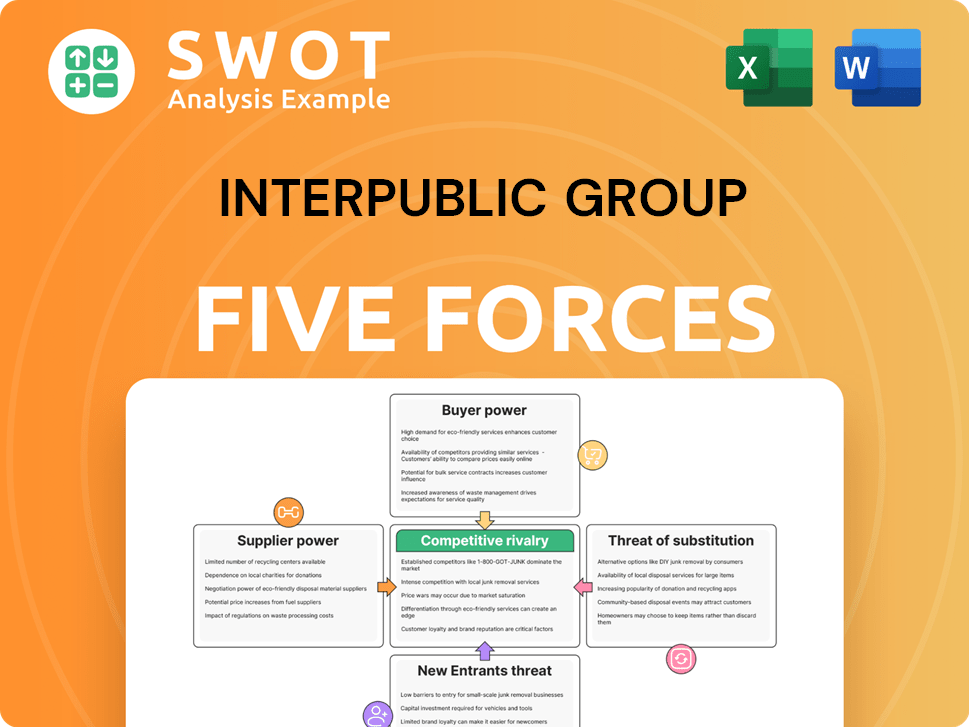
Related Blogs
- What are Mission Vision & Core Values of Interpublic Group Company?
- What is Competitive Landscape of Interpublic Group Company?
- How Does Interpublic Group Company Work?
- What is Sales and Marketing Strategy of Interpublic Group Company?
- What is Brief History of Interpublic Group Company?
- Who Owns Interpublic Group Company?
- What is Customer Demographics and Target Market of Interpublic Group Company?
Disclaimer
All information, articles, and product details provided on this website are for general informational and educational purposes only. We do not claim any ownership over, nor do we intend to infringe upon, any trademarks, copyrights, logos, brand names, or other intellectual property mentioned or depicted on this site. Such intellectual property remains the property of its respective owners, and any references here are made solely for identification or informational purposes, without implying any affiliation, endorsement, or partnership.
We make no representations or warranties, express or implied, regarding the accuracy, completeness, or suitability of any content or products presented. Nothing on this website should be construed as legal, tax, investment, financial, medical, or other professional advice. In addition, no part of this site—including articles or product references—constitutes a solicitation, recommendation, endorsement, advertisement, or offer to buy or sell any securities, franchises, or other financial instruments, particularly in jurisdictions where such activity would be unlawful.
All content is of a general nature and may not address the specific circumstances of any individual or entity. It is not a substitute for professional advice or services. Any actions you take based on the information provided here are strictly at your own risk. You accept full responsibility for any decisions or outcomes arising from your use of this website and agree to release us from any liability in connection with your use of, or reliance upon, the content or products found herein.